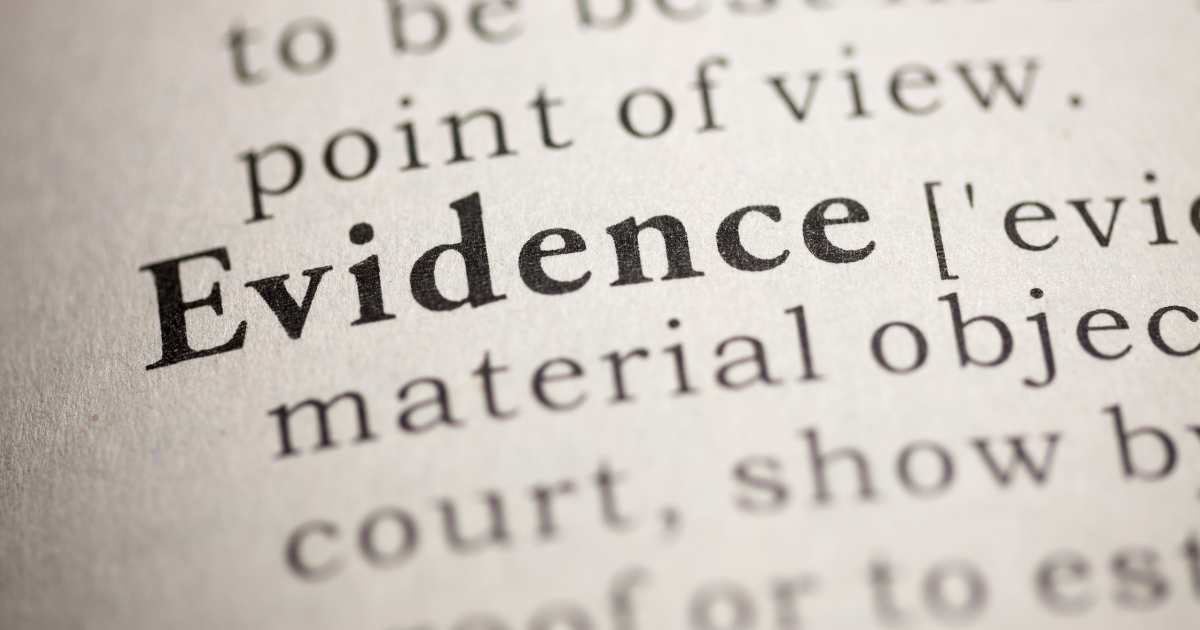If you have a family court hearing approaching, you’re surely experiencing a bevy of emotions. You are likely considering just how much is at stake with your hearing and weighing the potential outcomes. You may be anxious about the proceedings or just want some peace of mind about your next steps. For many people, preparing for the hearing can not only ensure you are ready to face the rigors of the courtroom – it can also be an effective way to help manage those emotions and process the situation you’re facing. Preparation can give you a sense of comfort while you’re watching your case come together and help you feel confident in it.
The basis of preparation for a family court hearing is built around the available evidence for your case. You need to have solid evidence to support the petitions or arguments you wish to make. As a result, efficiently gathering evidence is critical to the outcome of the hearing.
As the court will weigh your evidence against the counter-evidence that’s presented, it’s crucial that your evidence not only create a comprehensive case for your claims but it must also be able to refute the claims that are made against you. This means that the process of gathering evidence should be thorough and well-understood so the arguments you make will work in your favor. This is especially true if you’re facing a custody case.
Collecting Evidence For an Arizona Custody Case
Collecting evidence for a custody case is often not easy, both emotionally and logistically. It can be difficult to look through your history of parenting your children with someone else with the knowledge that every interaction may be examined in court to make a case for your custody rights. At the same time, you know that the same is being done to you. We have no desire to downplay how difficult that can be. That’s why working with a lawyer to help you through the collection process is critical.
In fact, the very word “collecting” can be important when understanding the full process of preparing evidence for a custody case. Think about what it means to own a collection rather than “a bunch” or “a mountain” – a collection is carefully curated for a purpose, and not just a mountain of items. Preparing a collection of evidence for a hearing needs to follow the same principle: the evidence needs to be curated carefully to select things that will bolster your case. That means going through all the facts, data, and materials you have and pulling out those items that are the most relevant to your claims.

Once extracted, that evidence then needs to be organized in a way that will make your argument readily understandable to someone unfamiliar with your relationship with your child’s other parent. Returning to the collection metaphor, think about the way a museum organizes a collection so patrons can understand its value, history, and importance. The same will need to be done with the evidence you gather so the judge will recognize its significance to your argument. Finally, that collection will need to be put on display when it is presented to the court at the hearing. When presented well, collections tell a story. That is what the evidence will need to do for you.
Finally, that collection will need to be put on display when it is presented to the court at the hearing. When presented well, collections tell a story. That is what the evidence will need to do for you.
How to Gather Evidence in a Custody Case

The kinds of evidence that will be helpful in your case will depend on the particulars of your relationship with your child’s other parent and other factors of the case. Consider that you’ll benefit from developing a well-rounded case with multiple types of evidence, which generally means that relying too heavily on a particular piece or form of evidence may not make for the strongest case. That’s why, when you’re gathering evidence, the best policy is to look at everything and exhaust every option you can think of.
While we have a few ideas here of common forms of evidence, it can be helpful to think creatively as well and gather together anything that comes to mind.
Here are some of the most common:
- Messages
- Police Reports
- Videos and Photos
- Parenting Journals
- Testimony
- Personal Documents
Messages: What Kinds of Messages Can Be Used?
Any form of communication can be used as evidence in a child custody case. Text messages, emails, social media, letters, and even voicemails or audio recordings that you’ve made of particularly important interactions can be used. Given that all these are valid forms of evidence, it’s important that you make sure to keep your end of any conversations civil. You may still need to have regular communication to coordinate your children’s activities and schedules. In these circumstances, if your end of the communication is uncouth, that could be used against you.
It’s rare that any one particular message will make or break a custody ruling. This is only likely to happen if a particularly incriminating message is sent, but this is rare. The key to this kind of evidence is that it can serve to demonstrate a pattern. It serves as a kind of window into who a person is in their interactions with others. If you can demonstrate a particular behavior pattern through these messages, that may help your claim.
Police Reports: Are Police Reports Considered Evidence?
Police reports can be used as evidence in a child custody case. In particular, if the other parent of your child has committed domestic violence or some other violent act, that will be an important element of consideration. If this is the case in your situation, it should be one of the first pieces of evidence that you seek.
Videos and Photographs: Will Video and Photographs Be Admitted as Evidence?
Any photographic or video evidence that can support your case should absolutely be considered. Although these are not often available, they are some of the strongest forms of evidence that can be presented. They may be critical to bolstering your case, especially if your photos and videos demonstrate that you are able to provide a stable home for your child.
Testimony: Who Are the Best Witnesses For a Child Custody Trial?
When considering what makes someone a good witness, it’s important to think of the function that they serve in a child custody hearing. The purpose of the witness is to share what they’ve seen with the court to help you demonstrate why you deserve to spend time with your children. However, it’s important that the witness is deemed credible.
The more neutral a witness is, the more credible they are to the court. For example, If a witness has particularly strong ties to you, like a close friend or family member, the testimony can be heard, but it won’t likely be given the same weight as testimony from someone who is considered a neutral party. It’s even possible that someone who would have closer ties to the other parent yet testifies in a manner that corroborates your version of events may have a great deal of value. Generally, the best witnesses are those who know the children and situation well but lack any real reason to support a particular side. People like neighbors, doctors, teachers, and other caretakers have all been effective witnesses.
Witness testimony can take several forms, including:
- Character letters from people who know you and your child
- Other written testimony
- Courtroom depositions
- Custody evaluations from a neutral third party
Child’s Testimony: Will What My Child Has to Say Be Considered?

It is possible that your child could present their wishes before the court if they are considered to be mature enough. While many states require that they must be at least twelve years old, Arizona simply asks that a child be able to adequately express a preference. However, this is an option that should be very carefully considered, and the court is not required to adhere to the child’s wishes. It may be upsetting to ask your child to choose between the two of you. Especially given that the court’s duty is to act in the child’s best interests, not their wishes, you may not want to subject them to making such a choice.
Parenting Journals: What Is a Parenting Journal?
A parenting journal is a way for parents to remember incidents and occurrences that happen regarding their children. Parents take notes on many different things related to their kids, from things to celebrate and funny moments to ways they want to improve their parenting or concerns they have for their children. While these minor incidents may not be of use in court, keeping a journal that records things like the child’s other parent’s tardiness, refusal to meet for visitation, abusive behavior, or other critical occurrences you believe reflect your or the other parent’s relationship with your child can be useful. You can also keep ongoing records of your child’s behavior and emotional state while at your home and after visiting the other parent.
Other Personal Documents
In addition, you’ll want to set aside all personal documents that may demonstrate your ability to care for your children.
These include:
- Financial records, including paycheck stubs, tax returns, and expense reports regarding the care of your children
- Your child’s medical records
- Your child’s report cards and other school records
- Current or proposed visitation schedule, along with any missed or denied visitation
- Anything else that demonstrates your plan to continue to be a positive influence in your child’s life
Organizing and Presenting Evidence to Court
While the gathering of evidence is critical to preparing for a child custody case, it’s the process of curating that evidence that is particularly challenging. The reality is that the evidence needs to tell a story – it needs to make the case that you want it to make. From there, after hearing evidence from both sides, the court will make its ruling based on what it believes the true story to be and which parent will better serve the child’s best interests.
Once you’ve amassed the evidence you need to tell your story, it’s time to organize it. Purchase a binder with dividers and clear plastic sleeves to serve as your custody binder. Then, make three copies of each piece of evidence, including notes, receipts, documents, photos, and more.
Slide each set into a document sleeve to protect it and organize it as follows:
- Filing Documents (documents you’ve filed with the court for the case)
- Opening Statement (ask your attorney to help you create a summary of all the evidence you’ll be presenting)
- Evidence (most all your photocopied evidence will go here)
- Witnesses (create a witness summary for each that includes their expected testimony, any questions you would like to address, character statements, and other information)
- Case Summary
A family lawyer will be tremendously helpful in terms of organizing and presenting the evidence to the court. It’s not enough to have a good story or a true story. It also needs to be well-told. Telling a story “well” depends on the audience. In this case, the audience is the court. When you work with an experienced legal team, they understand how to speak to this audience because they know what makes for a story that’s compelling to them. They can also ensure that it doesn’t get bogged down in details or information the court isn’t interested in hearing. While gathering evidence is critical to a child custody hearing, the evidence can’t do anything for your case if it isn’t properly curated and presented.
Don’t Go It Alone at Your Family Court Hearing
While it can be helpful to understand what kind of evidence is useful at a family court hearing, no amount of reading guides and advice can prepare you like experience. That’s why working with an experienced lawyer can be so important. Lawyers, like the trusted team at The Valley Law Group, have a wealth of experience in family court. This allows them to recognize potentially beneficial evidence that might be unique to your situation and what you’re trying to present.

We can also present that evidence to the court. It’s critical that the evidence be clearly and concisely presented in a hearing. Lawyers have the benefit of working only with the evidence that is prepared for the hearing. They can present that evidence in a compelling way that makes the case for your claims while not falling victim to tangents that may mitigate their impact.
The best advice we can give you as you prepare for your family court hearing is that you should not attempt to do it alone. There’s too much at stake for you. For skilled guidance and formidable representation in your upcoming family court hearing, contact The Valley Law Group to schedule a consultation.

Jonathan Roeder, Founder/Director of Marketing of The Valley Law Group, is an Arizona native who has dedicated his life and career to the service of others. After graduating salutatorian of his high school class, Jonathan attended beautiful and prestigious Pepperdine University, where he majored in Political Science. During his tenure at Pepperdine University, his passion for helping others grew after securing a clinical position with a residential treatment center for juveniles with substance addictions. Post-graduation, Jonathan returned to Arizona and served as a residential manager for mentally and physically disabled homes.

